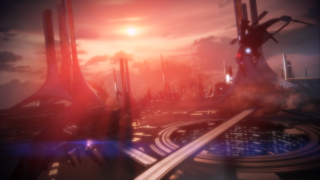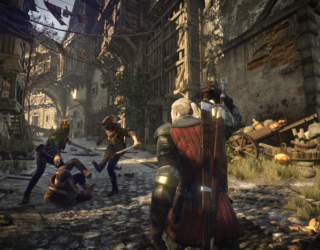Gaming and mental health
Back in the late summer of 2015 I recovered from a long bout of depression after spending 4 years circling the drain and feeling like I had less and less control over my future – something that has felt very common among people of my generation since 2008. I would often find myself on the sofa playing games when I felt low and powerless, indulging in a hobby I’ve had ever since I got to play on my Dad’s Commodore 64 at four years old. I’ve never been concerned by games as part of a ‘power fantasy’ and have always been more interested in the way that games mix exploration and narrative to give a glimpse into worlds other than our own. I have put thousands of hours of my life into gaming – some of my favorite pieces of fiction are in games – whether it’s Grim Fandango, The Stanley Parable, Bioshock or The Last of Us, I genuinely believe gaming has the potential to tell compelling stories to match the best books, TV shows or films.
There are plenty of decent articles about the risks of gaming. How escapism, however temporary, can lead to people becoming addicted, depressed and detached, failing to make real changes in their own lives that will improve their situation and their mental health. It is a real danger that cannot be ignored – that becoming reliant on computer games as a permanent refuge from the real world can compound social isolation and depression – many of my own friends who are gamers have told me as much about their own experiences. But that isn’t the whole story. In my case at least, changing my lifestyle and accessing treatment in the real world was what mainly improved my mental health, but gaming provided a useful outlet during the worst times.
Games can help us to develop empathy, by explaining what depression, isolation and other conditions can be like to people who don’t have them
The capacity for games to provide help for people with mental health issues, and a sense of temporary respite is important to understand. This is the case more than ever, given that the last few years have seen seemingly endless cuts to mental health services and treatment, meaning that someone might have to wait months or even years before seeing a therapist to get the help they need. Games at their best provide engaging stories, innovative ways of developing narratives or breaking conventions and, with the rise of VR – a tool useful for play, but also for real world applications such as art, architecture and medicine – of building worlds to explore and interact with. They can also provide a way of interacting with others and finding a community of like minded people – both offline and online – something very useful for someone who is experiencing the isolation that often goes along with mental health conditions. Games can also help us to develop empathy, by explaining what depression, isolation and other conditions can be like to people who don’t have them, and serve as a useful way of breaking down the stigma that still persists in society and which makes it so difficult to talk about how these conditions are actually experienced.
However, my point is not to talk about whether games are good or bad for mental health – that has already been explored well elsewhere. What I want to talk about instead is the way games could be used to inspire change, to argue that gaming has the power, or at least the potential power, to tell interactive stories about the future that can provide an inspiration for the kind of real world political and social change that would ensure people don’t end up feeling depressed in the first place. After all a huge proportion of mental health conditions like anxiety and depression draw their destructive power from the social reality of the day; problems of overwork, struggling with money, bills and rent, or with issues such as racism, homophobia or sexism.
I’m Commander Shepard, and this is my favorite store on the Citadel.
The designers of the Mass Effect series definitely can’t be accused of a lack of imagination. The story of a sentient race of skyscraper sized bio-organic machines coming to strip all intelligent life from the galaxy is still one of my favorites. I’ve put well over 120 hours into the series exploring the galaxy, completing missions and interacting with hundreds of characters. The trilogy contains a wealth of interesting ideas about a multitude of different species, cultures, technologies, histories and future events to interact with and learn about.
I’m bored by the fact that seemingly every TV show, game or film needs to portray a world which is utterly fucked. I’m just as bored of any politics that acts like people don’t have the capacity to change the world for the better
Mass Effect is probably one of the more interesting visions of the future presented in gaming, a future where humanity has united politically, created incredibly advanced technology and entered the galactic stage to engage in a complicated and intricate society. Most other games from Deus Ex to the Fallout series, even if they are great to play and have imaginative stories, portray a future where the world is a crumbling corporate dystopia, or a post apocalyptic wasteland. Even the Mass Effect series contains elements of dystopia within its generally more optimistic view of the future. Human society is very militarized and one race, the Quarians, have fallen from a hyper advanced, fully automated society to one of exile and near extinction, although to the series’ credit players can resolve this story thread in a way that repairs rather than conforms to its dystopian setting.
I love dystopian fiction, but I’m also increasingly bored by the fact that seemingly every TV show, game or film needs to portray a world which is utterly fucked, now and forever, and which will probably only get worse. I’m just as bored of any politics that acts like people don’t have the capacity to change the world for the better, and that they should therefore give up without even trying. I have what David Graeber calls Despair Fatigue.
There’s a lack of meaningful decisions in open world games that emphasize choice: there are always hidden barriers
Despite being some of my favorite gaming series, Mass Effect still has a problem, something that I could never quite get out of my mind. The games are able to imagine species of sentient robots who can communicate with each other using a data cloud, an entire political and social history of dozens of species, and a future of abundance where asteroids and planets are mined for their resources. But the economy of the galaxy is still a recognizably capitalist one – corporations are everywhere, somehow nearly every species in the galaxy has independently arrived at the same economic model within a specific historical context, business greases the wheels of galactic politics and your character can endorse different shops for a discount. The usual tropes of gaming mean that resources and equipment need to be bought and sold despite being obviously abundant in the universe. As pointed out in other articles about the lack of meaningful decisions in open world games that emphasize choice, there are always hidden barriers – some constrain by game mechanics and technological limits, but others constrain by the vision of the designers. To paraphrase Mark Fisher – it is easier to imagine the end of the galaxy than the end of capitalism.
New Utopias
Gaming as an art form can offer so much more than this partial vision and can be a medium for imagining a fictional future that includes new ways of ordering political, economic and social life. Sadly, it is something that it has not yet fully realized, still mostly tending to either recreate our existing society but with spaceships and AI, or a brutal post apocalyptic landscape with humans living in the crumbling remains of contemporary society – right-wing wet dream The Division being this year’s most blatant example. Gaming (and popular culture in general) has a tendency these days to dwell in dystopian or post apocalyptic versions of humanity’s future.
Even the world of Mad Max: Fury Road contains a narrative in which change is possible even in the darkest times – something that gaming seems to lack
When I was depressed between 2011 and 2015 everything felt negative and ultimately pointless – both personally and when I looked at an economic and political situation that only seemed to get worse across the world. My mood was reflected in the games I was choosing to play, and how I was choosing to spend my time: booze and drug binges and other self destructive behavior on weekends and feeling sorry for myself slumped in front of a console or laptop to help me cope and experience some catharsis in between. Some games create worlds that are incredibly bleak to create a sense of the helplessness and powerlessness in the player which can be a great way to tell a story and dystopian narratives are important in their own right. Mad Max: Fury Road was one of my favorite films in 2015 and Bloodborne, Dark Souls, Papers Please, Limbo and Silent Hill 2 are some of my favorite games precisely because of their negative, oppressive atmospheres. However I would argue that it is important to have a variety of narratives and to also present a vision of the future based on hope and progress in order to inspire people to achieve things, after all even the latest Mad Max film had a central narrative that change is possible even in the darkest times – this is something that gaming seems to lack.
Utopian stories have been a source of political and social inspiration for hundreds, if not thousands of years, they illuminate problems in our present while also modelling solutions for our future. Medieval folk tales about the Land of Cockaigne inspired peasant revolts, while the utopian novels of the 19th century Russian Cosmists, who imagined humans overcoming gravity and social inequality together, acted as a major influence for Soviet policies on space travel – policies which, for all the failures that followed, would eventually lead to the launch of the Sputnik satellite and Yuri Gagarin being the first human in space in 1961. Other examples include early 20th century popular working class culture concerned with getting away from work and having fun, which led to struggles over reducing hours on the job and also contributed to predictions by economists that the working week would be 15 hours or less by 2030. Popular post-WW2 TV shows such as Star Trek and The Jetsons imagined extremely advanced technology and a different social structure (to varying degrees) and have served as the primordial graphical sauce to modern developments and ideas such as green energy, full automation of production and transport, Universal Basic Income, a possible reduction in the working week, 3D printing and virtual reality.
We’re imagining a time when we could become more complete people instead of being identified with one job or another – or being demonized for having no job at all, as the mentally ill usually are
There has been a recent return of (cautious) utopian thinking in politics, providing new visions of the future. From the manifesto of a society with full automation and an end to wage labor presented by Alex Williams and Nick Srnicek in Inventing the Future, to ideas of Fully Automated Luxury Communism and universal material abundance championed by Novara Media and others. From Yanis Varoufakis describing his vision of the future as ‘Star Trek’, to Shadow Chancellor John McDonnell outlining his vision for 21st century Britain as an entrepreneurial state developing new advanced technologies and ways of organizing society more democratically, or “Socialism with in Ipad”. I have personally found ideas on Universal Incomes and imagining a future of automation, equality and less work to be incredibly inspiring – imagine all the things that could be done instead of pointless paperwork or data entry! Writing, reading, socializing with family and friends, learning new languages, riding my motorbike, photography, playing more games, sleeping, even doing the kind of work that really matters like looking after kids or elderly relatives – the list could go on for pages and pages. In short the power of utopianism is in imagining a time when we could become more complete people instead of being identified with one job or another – or being demonized for having no job at all, as the mentally ill usually are.
The task of creating a vision of a future human society outlined in the likes of Inventing the Future is what Srnicek and Williams call a ‘full spectrum project’ – that is, something which can developed on all levels of society including popular culture, the media and academia, and which will take place over a variety of different time scales. Effective change requires people making demands to be fought for and won, and fiction is a fantastic avenue to provide a vision of the future that we can demand in the real world. The point is not that computer games will solve all of our problems, either personal or societal, but rather that they provide an avenue to explore and spread ideas for use in our everyday lives. In their small way, computer games could be a way of popularizing visions of a better world, and of taking dry academic ideas and making them accessible to a non academic audience. Just as all the best works of utopian fiction have done in the past, computer games can help more people to overcome the seemingly endless sense of despair that has dominated popular culture and politics in recent years.
Image: Ryan Somma



